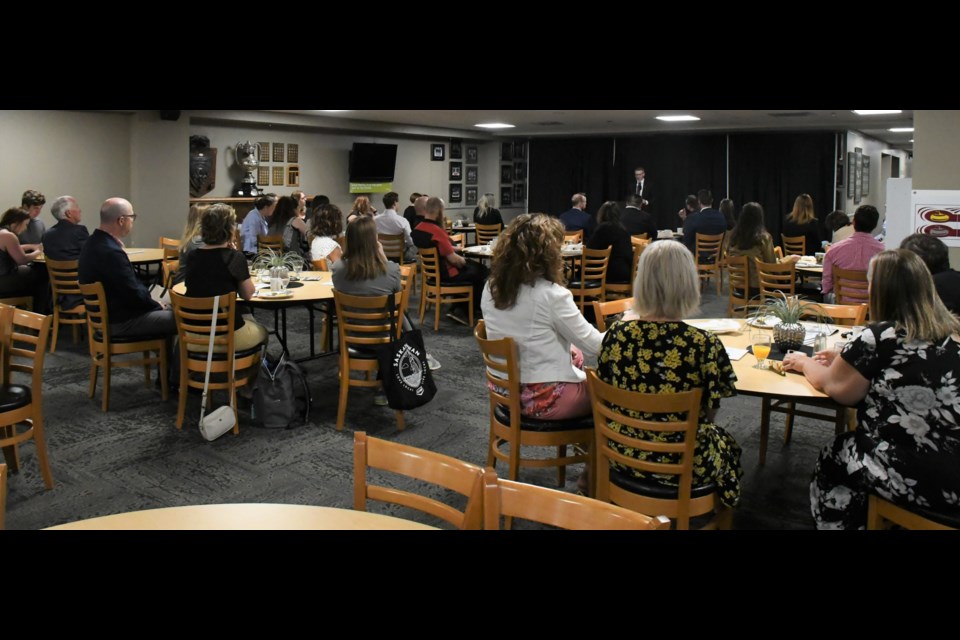The province has invested $500 million into mental health and addictions services and added hundreds of treatment spaces throughout Saskatchewan, but more can always be done, a government minister says.
The Hon. Everett Hindley, minister of mental health and addictions, seniors, and rural and remote health, spoke to nearly 50 people at the Events Centre on June 15 during a breakfast that the Chamber of Commerce and two Sask. Party constituency offices organized.
The minister spoke briefly about recruiting and training more health-care workers but focused mainly on mental health and addictions.
Overdoses have been occurring too often in communities large and small — including three deaths recently recorded in Moose Jaw — while this crisis is having a devastating effect on residents, Hindley said. This underscores the need for the government, community-based organizations (CBOs) and other partners to work closely to serve people in need.
“Accessing the high-quality addictions treatment is important to us as a government … ,” he stated, pointing out most people know someone who struggles with mental health or addiction issues. “It’s hitting closer to home than ever before.”
The provincial government is investing in mental health supports across Saskatchewan, including in Moose Jaw, the minister continued.
For example, the government supports community recovery teams, which provide intensive support to people with persistent mental health challenges. This holistic approach ensures clients can manage symptoms, avoid hospitalizations and achieve their goals.
“That’s what’s really key about this topic, is everybody … is on a different pathway. … It’s up to us to help them find that pathway, to find that way to long-term treatment and recovery,” Hindley said.
The minister singled out Moose Jaw’s Police and Crisis Team (PACT), which combines an officer with a mental health worker to support people struggling with mental illness. He noted that the government wants to replicate the program in communities that request them and expand the units where they already exist.
“We know it’s an effective program and an important part of what we’re doing (based on front-line staff testimony),” he added.
The province also supports free rapid access counselling here for individuals and families. While the program operates in 24 communities, the province has provided funding to expand it to seven more municipalities, Hindley said.
Furthermore, the province is expanding the program to include children and youths and helping organizations hire more staff.
Many people have complex needs that require complex supports, while some people need help quickly and can’t wait months to see a specialist, Hindley said. So, these programs — in person or online — can help people access help fast when and where they want.
The province has contributed half a billion dollars toward mental health and addiction services, which supports more than 500 treatment spaces, including 24 physical spaces in Moose Jaw and 30 spaces online. Meanwhile, the government wants to add another 150 treatment spaces.
“We know there’s a need. That’s what one of our biggest pressures is, is people waiting to get into detox (and) waiting to get into long-term treatment … ,” the minister said. “And it is there, but we just don’t have enough capacity.”
Public awareness about treatment is important to help reduce the stigma, Hindley said, so the government is working with CBOs, front-line health-care workers, emergency services and other groups on campaigns to reach all Saskatchewanians.
“We want to continue to make sure we’re promoting that message that it’s OK to reach out for help (and) it’s OK to talk about it and make sure that people know that they can access that help,” he added.
Hindley also took several questions from people in attendance, which focused on Naloxone access, harm reduction, addressing farmers’ mental health, the paramedicine program, PACT, more training for community service providers and reducing barriers to access training.




